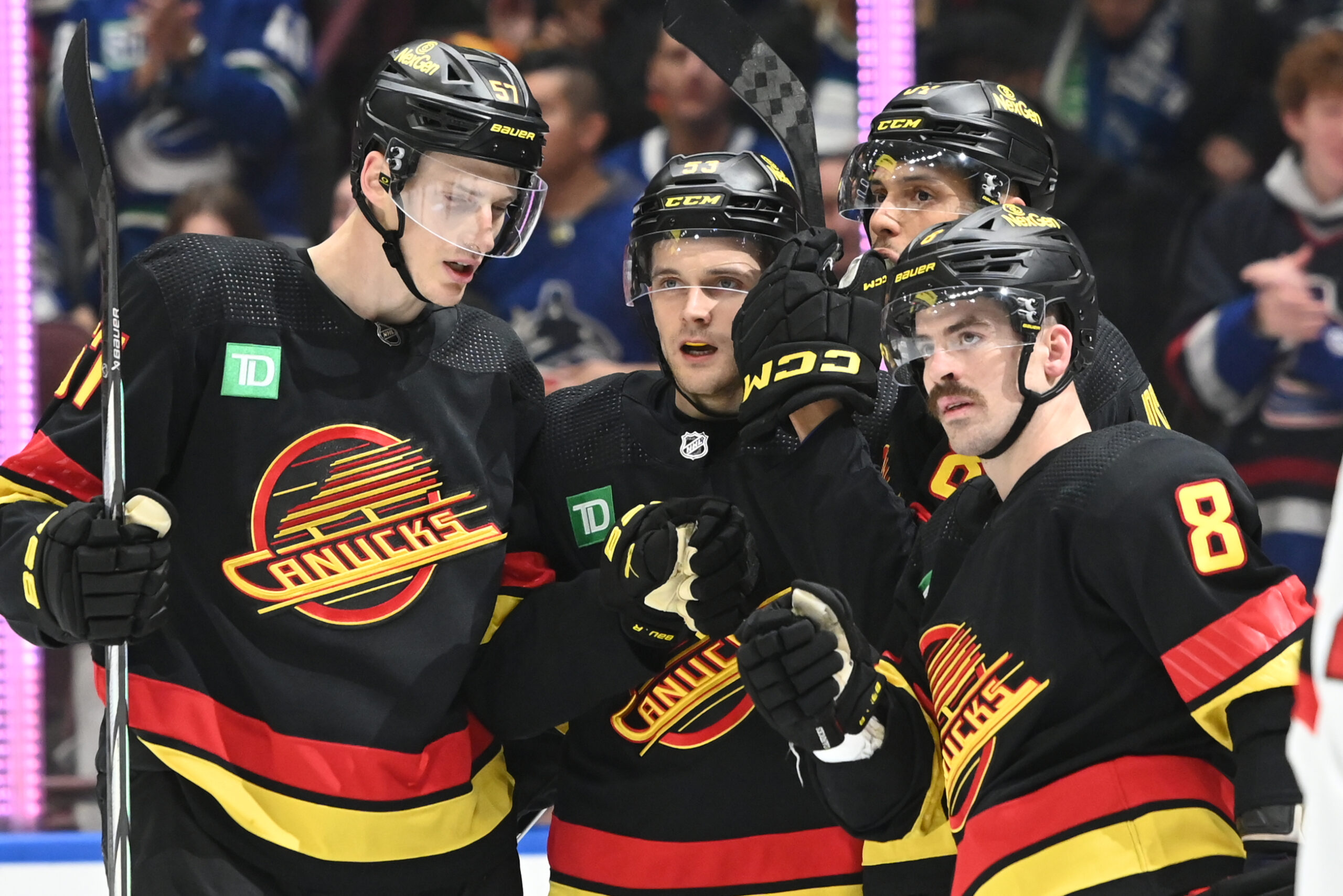At the start of the Vancouver Canucks season, no one thought signing Dakota Joshua would be a priority. 15 goals and a spot on one of the best third lines in the NHL later, though…
Someone Will Sign Dakota Joshua
We covered Joshua’s early history and just how well he’s done in Vancouver earlier this year. The Canucks got him because they were a little desperate and a lot willing to take a chance. So they offered a 26-year-old winger with 42 NHL games played a two-year, one-way contract.
It’s the sort of deal that epitomized the Jim Benning era of free-agent signings. Big, risky swings at what was hopefully underperforming veteran players to fill bottom-six roles. Ghosts of Sam Gagner, Jay Beagle, Michael Del Zotto and many others still haunt Canucks fans even now.
But the numbers for Joshua were relatively low. The opportunity for him certainly appealed, and a guaranteed income clinched it. Vancouver needed size and speed, and Joshua had both. Joshua wanted a clear shot at an NHL job, and Vancouver had space. What sounded like a perfect fit actually was!
Oh, Dakota!
Joshua’s first full season went well, especially given how the Canucks themselves did. It’s not like they tanked, but 38 wins was a long way away from the playoffs. Still, he locked up a place on the fourth line and started showing he could stick on special teams.
That aspect of his improved play highlights just how surprising Joshua has been. Being a penalty kill option is essential for a bottom-six player who wants to extend their career. He’s now one of the team’s first options and has earned every second. Not much power play time yet, but that might be coming.
Signing Dakota Joshua, a bottom-six winger with some skill, wouldn’t be all that difficult if that’s all he was. Joshua was given the opportunity and he has seized it with both hands. His scoring is up, his minutes are up, his defence has improved, and then there’s everything else he does. Returning from an injury against the Dallas Stars he threw a half-dozen hits and played almost 16 minutes. More importantly, he regretted nothing about getting injured when he came to the defence of teammate Conor Garland.
That fight, against Chicago‘s Mackenzie Entwistle, finished a Gordie Howe hat trick. So far this season, Joshua has 15 goals and 28 points in just 55 games. He may have been drafted as a tough guy, and he’s certainly that, but he’s grown beyond the description.
Making the Numbers Work
Joshua isn’t the perfect player, of course. For one thing, if he continues his rough-and-tumble style there’s no guarantee he’ll play a full 82-game season. And while he has decent puck skills, you’re probably in trouble if he’s on your top line.
Vancouver has had some success with that kind of “promoted” player, but to get an Alex Burrows you need Sedins. And the player Joshua has worked best with is Conor Garland. The two are an excellent match, each improving the other’s play. But that’s also on the team’s third line.
This is the crux of it. The hardest part of the Vancouver Canucks signing Dakota Joshua is knowing where he’ll fit. It took a few years to find where Garland worked best. That’s with Joshua on the third line. But Garland’s also a $5 million player, who’s on that third line. It wasn’t that long ago when $5 million was what you wanted to pay the ENTIRE third line.
Dakota North and South
Joshua isn’t going to demand that amount (though frankly who knows). A team out there may be desperate enough to make the offer. But outliers aside, Joshua doesn’t have a long track record in pro hockey. This is his second full season in the NHL and he’s turning 28 in May. This could easily be his peak season.
Now, that means a 20-goal pace and an important role on the penalty kill, so it’s a pretty good peak. But it’s hard to know what his “average” might be with such a small sample size. He was phenomenal with the Springfield Thunderbirds during their 2021-22 AHL Calder Cup playoff run, but that’s not telling us how he’ll do for Vancouver in another month.
There is another important detail about his age: this is probably going to be his best shot at a big deal. Joshua has made, according to Capfriendly.com, about $1.6 million over his hockey-playing career. That’s a lot of money for most of us, but not for an NHL player. With his next deal? He’ll make more than that in a single season.
Again, this is where it gets a bit tricky. It’s not like a team can look at signing Dakota Joshua and think “he’s our future!” Getting Elias Pettersson‘s contract done didn’t actually have a whole lot of variables to it. He is obviously talented enough to anchor a franchise, so make the offer worth it.
For Joshua though, how long is he going to play? Is he going to improve at his age, or even stay consistent? And if so, for how long? And what does he want to do? The Canucks are a strong team and will be for the next few years. But what if another team sees more for him? A bigger opportunity might be elsewhere.
Numbers Don’t Always Matter
Given Joshua’s age and use in Vancouver, a short-term deal is typical. Most teams like to use the bottom of the lineup to save money, signing deals like Joshua’s current one. It’s a high-rotation position, with plenty of players who are either good enough or on the edge of it. One or two years, below the $1 million mark on the cap.
There are exceptions, though. Specialists like Teddy Blueger ($1.9 million) or Pius Suter (2 x $1.6 million) were brought in to be defensive centres. In fact, until Sunday’s game Suter, Blueger, and Joshua were all tied with 26 points, though Joshua played five fewer games.
Though he’s listed as a centre, Joshua isn’t used there often. So shouldn’t he be paid as they are at best? Aren’t both of those individuals an example of a great comparable showing what his cap hit should be? To some degree, sure. They’ve had consistent numbers over the past four or five years. Blueger even gets in scraps on occasion.
But there’s always more to it than that. If you count the jerseys in attendance, Joshua’s outpaces the other two by a considerable margin. That’s something that matters to fans. It’s a dangerous game to pay fan favourites because fans like them, but it can also be a profitable one. Nothing beats winning, but merchandise sales come close.
Highs and Lows
The last variable is contained in the salary cap. The Canucks have a huge number of unrestricted free agents to decide on and a couple restricted ones, too. Oliver Ekman-Larsson‘s buyout penalty is jumping up $2 million. Yes, the cap is increasing next season, but they only have three defencemen under contract.
It’s going to be a squeeze. Not everyone will be returning next year, that’s a given. It’s always hard to guess who deserves the credit for the improvement when a team overperforms as much as the Canucks. Because a lot of it just might be luck. But if it isn’t, who stays?
Signing Dakota Joshua isn’t the most important contract the team will negotiate this offseason. But it might be the most complicated.
A fan favourite who adds a physical element the Canucks lack among their forwards. An older player whose skills may start diminishing soon. A fighter that can miss substantial time. A penalty killer with speed enough to be a threat short-handed. A player with few enough games he may improve his numbers in the next couple years. And all trying to fit within the salary structure of the team.
Our guess? He wants to hit a home run with this deal, but probably also wants to stay in Vancouver. Ideally, he accepts he’s a very good third-line contributor in return for a bit more time.
Four years at $2.25 million per gets him good total numbers at a decent cap hit for the team. It’s long, and the Canucks would assume some risk in return for the lower yearly hit. If he wants more up front, a three-year deal at $2.75 million should be acceptable for both of them.
Toss this straight out the window if Joshua becomes a hero in the playoffs, though.
Main photo: Simon Fearn-USA TODAY Sports






